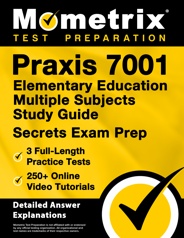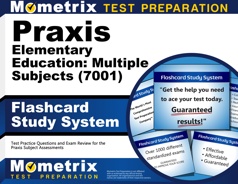The Praxis Elementary Education: Multiple Subjects (7001) exam is a test used to evaluate the knowledge and skills of prospective entry-level teachers for elementary school.
Click “Start Test” above to take a free Praxis 7001 practice test!
Praxis (7001) Exam Outline
This exam is split into four subtests and contains a total of 225 questions. Here is a closer look at each subtest:
Teaching Reading (7002)
This subtest contains 80 questions and has a time limit of 110 minutes. These questions assess your foundational reading skills, your knowledge of informational texts, and your ability to write, speak, and listen.
I. Phonological and Phonemic Awareness and Emergent Literacy (12 questions)
- Methods for teaching phonological awareness
- Methods for teaching phonemic awareness
- Developing students’ expressive and receptive language components
- Teaching beginning readers the concepts of print
- Helping emergent readers fluently identify uppercase and lowercase letters
- Formal and informal assessment methods
II. Phonics and Decoding (16 questions)
- Teaching phoneme-grapheme correspondence
- Teaching phonics systematically and recursively
- Common phonics patterns and rules
- Teaching morphological analysis
- Teaching syllable types in decoding multisyllabic words
- Supporting student recognition of non-decodable words
- Monitoring student progress for phonics and decoding
III. Vocabular and Fluency (19 questions)
- Using expressive and receptive vocabulary
- Teaching vocabulary systemically and repeatedly
- Matching instructional methods to word complexities
- Word soling and structural analysis
- Guiding students to understand a variety of words
- Fostering students’ automaticity through prosody, accuracy, and appropriate rate
- Methods of supporting fluent reading behaviors
IV. Comprehension of Literary and Informational Text (19 questions)
- Supporting students’ listening comprehension
- Supporting students’ speaking and listening skills
- Teaching comprehension systematically and explicitly
- Guiding students’ self-selection of texts to increase motivation and engagement
- Differentiating tasks, instruction, and materials
- Teaching the use of graphic an semantic organizers
- Teaching genres, structures, and features of literary and informational texts
- Teaching literary devices
- Using technology to support students’ ability to examine online resources
V. Written Expression (14 questions)
- Teaching writing as a recursive process
- Teaching writing to all learners
- Integrating reading and writing
- Using digital tools for communication, writing, and publishing
- Connecting the teaching of both decoding and encoding as reciprocal skills
- Spelling development
- Teaching the structure of written language
Mathematics (7003)
This subtest contains 40 questions and has a time limit of 55 minutes. These questions assess your knowledge and skills pertaining to a broad scope of mathematics.
I. Numbers and Operations (16 questions)
- Place value system
- Basic concepts of number theory
- Operations and properties of rational numbers
- Proportional relationships and percents
- Determining the reasonableness of results
II. Algebraic Thinking (12 questions)
- The meanings of linear equation and inequality solutions
- Algebraic equations, expressions, and formulas
- Recognition and representation of patterns
III. Geometry and Measurement, Data, Statistics, and Probability (12 questions)
- Solving problems involving measurement
- Classifying figures in one, two, and three dimensions
- Representing and interpreting data presented in various forms
- Components of the coordinate plane
- Solving problems involving area, volume, perimeter, and surface area
- Graphing ordered pairs on a coordinate plane
- Interpreting the probability of events
Social Studies (7004)
This subtest contains 55 questions and has a time limit of 55 minutes. These questions assess your knowledge and skills pertaining to a broad scope of social studies topics, including government, economics, geography, and history.
I. United States History, Government, and Citizenship (25 questions)
- European exploration and colonization of the United States
- US expansion
- American Revolution
- Developments in the United States in the 20th century
- Key documents and speeches throughout US history
- Connections between causes and effects of events
- Rights and responsibilities of democratic citizenship
- The nature, forms, and purpose of government
II. Geography, Anthropology, and Sociology (16 questions)
- World and regional geography
- Uses of geography
- Interaction of human and physical systems
- How people of different cultural backgrounds interact with their communities, environment, and families
III. World History and Economics (14 questions)
- The role of cross-cultural comparisons in world history instruction
- Major contributions of classical civilizations
- The role of the government in economics
- The role of economics in government
- Transformations and developments in the 20th century
- The effects of economics on resources, population, and technology
- Key terms and basic concepts of economics
Science (7005)
This subtest contains 50 questions and has a time limit of 55 minutes. These questions assess your knowledge and skills pertaining to earth science, life science, and physical science.
I. Earth Science (16 questions)
- Earth history
- Using resource and research material in science
- The structure of the Earth system
- Earth and the universe
- The unifying process of science
- Earth cycles, patterns, and changes
- The processes of the Earth system
- Science as an inquiry
- Science as a career, a human endeavor, and a process
II. Life Science (17 questions)
- Change over time in living things
- Interdependence of organisms
- Regulation and behavior
- The structure and function of living systems
- The unity and diversity of life, classification, and adaptation
- Personal health
- Reproduction and heredity
- Using resource and research material in science
III. Physical Science (17 questions)
- Forces and motions
- Energy
- Chemical and physical properties and structure of matter
- Interactions of matter and energy
- Understanding science as a human endeavor, process, and career
Check Out Mometrix's Praxis 7001 Study Guide
Get practice questions, video tutorials, and detailed study lessons
Get Your Study Guide
Praxis (7001) Exam Registration
To register for the Praxis Elementary Education: Multiple Subjects (7001) exam, you will need to create an online account with ETS. Through this account, you can submit an application to take the exam.
During registration, you will be asked to select the test-taking format (remote or at a testing center), test location (if you are taking the test at a testing center), and test date. You will also need to select how many subtests you would like to take. Your examination fee will differ depending on how many you choose to take in one sitting:
| Subtest | Amount |
|---|---|
| Single Subtest | $85 |
| All Subtests | $220 |
Test Day
In-person Testing
You should arrive at the testing center 15-30 minutes earlier than the scheduled appointment to allow time for the check-in process. After you arrive, you will be asked to sign in and present a valid form of photo ID to the proctor. If you fail to bring your ID, you will not be able to take the exam.
Personal items are not allowed in the testing room, so they must be stored in a secure locker outside the testing area. This includes your phone, wallet, keys, bags, books, notes, and accessories.
Just before the exam starts, you will be given a brief tutorial on the testing system. You will also be given everything you need to work out any calculations by hand (no calculator will be provided).
Remote Testing
You should log into your testing account 15-30 minutes prior to the scheduled exam time. The proctor will ask you to show a valid form of government-issued photo ID, and they will ask you to scan your surroundings using your webcam.
Once your exam begins, you cannot leave the webcam view, take breaks, or talk to yourself. Your focus must be on the exam, and other people must be out of your testing space while you take the exam.
Should the proctor determine that you are not following the guidelines for remote proctoring, your exam can be canceled, and your registration fees forfeited.
How the Praxis (7001) Exam is Scored
Your Praxis score is based on the number of questions you answer correctly. This is known as your raw score. The raw score is then converted to a scaled score. The scaled score you need to obtain differs slightly depending on which state you take the exam in.
You should receive an official score report about 5 weeks after testing.
Check Out Mometrix's Praxis 7001 Flashcards
Get complex subjects broken down into easily understandable concepts
Get Your Flashcards
FAQs
Q
How many questions are on the Praxis 7001 exam?
A
There are 225 questions on the exam.
Q
How long is the Praxis 7001 exam?
A
The overall time limit for the exam is 4 hours and 35 minutes.
Q
What is the Praxis 7001 passing score?
A
The passing score for the exam will differ depending on where you take it.
Q
How much does the Praxis 7001 exam cost?
A
The examination fee for all four subtests combined is 220.
